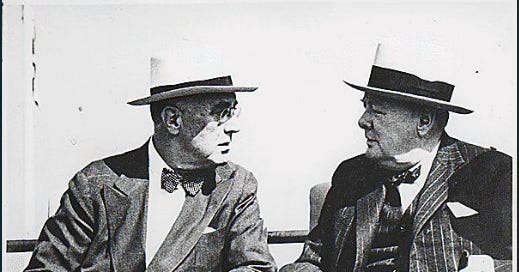John Mueller is one of my favourite political scientists.
Mueller is a careful and independent thinker, willing not only to transgress conventional wisdom in his field, but to criticize overwhelming public opinion. In 2006, Mueller published Overblown, an attack on the wildly disproportionate and counterproductive Bush administration response to terrorism. It was the height of the hysteria. That sort of contrarianism takes intellectual courage. And Mueller’s writing, unlike so much of what he criticized, looks good years or even decades later. (It helps that he’s a graceful writer with a sense of humour. “Serious” and “leaden” are not synonyms, my academic friends.)
So when John Mueller writes that the Israeli response the October 7 atrocities is misguided, we should pay attention.
Mueller doesn’t doubt that Israel’s response is deeply human. Who wouldn’t want to annihilate the murderers and rapists who committed those hideous crimes? Nor does he deny that Israel is within its rights to invade. International law permits nations to defend themselves by military means, and it permits civilian casualties in those responses provided those casualties are not intentional and the attacker takes reasonable steps to minimize them. As international law must. Otherwise, any attacker ruthless enough to duck behind women and children — the central Hamas tactic — could render itself bulletproof. And human shields would become a feature in war everywhere.
But being lawful or just does not, in itself, make a course of action wise.
Mueller:
The notion that a restrained reaction to outrageous provocation is often the wiser course has wide relevance. For example, it certainly applies to the U.S. reaction to 9/11, which cost trillions and led to well over a hundred times more deaths than the impelling event.
When Joe Biden flew to Israel, he clearly and forcefully expressed support for Israel — but also urged Israel to learn from the colossal tragedy that was the American response to 9/11. The United States threw away the goodwill of the world that it had on 9/12. The United States spent staggering sums on policies whose only practical effect were to set the Middle East aflame and recruit new armies of extremists and terrorists. Surely, after all that, the lesson was clear: Death cults like Al Qaeda and Hamas want to provoke wild overreaction. They rejoice at slaughter. They delight in misery. They dream of chaos. Let us not give them what they want.
I fear that, in time, Israelis will look back on that speech, and that moment, and recognize the hard-won wisdom Biden offered them. And feel profound regret that their government didn’t listen.
There is one final point I’d like to add.
No war in history was more justified than the war to destroy German and Japanese fascism. No policy was more necessary than the determination to fight until the enemy unconditionally surrendered.
And yet there is no question that even in that righteous crusade the passions of the moment led to indefensible escalations. The mass aerial bombing of civilians, in particular, was an atrocity. Worse — given the stakes — it was a mistake. Massive resources were poured into strategic bombing. The same resources directed elsewhere could have done far more damage to the enemy.
We see similar tendencies in post-war planning.
In 1944, US Treasury Secretary Henry Morgenthau proposed what became known as the “Morgenthau Plan.” I won’t go into the details here. Wikipedia has an excellent summary.
The essence of the plan was to dismember and largely deindustrialize Germany, turning it into a handful of agrarian states, so Germany could never wage war again.
At a time when two generations of young men had been ravaged by world wars instigated by Germany, when the continent and the international order had been torn apart, twice, by Germany, it’s not hard to understand the appeal. Many top officials backed the plan, including Churchill and Roosevelt.
And they supported this plan knowing it would inflict a horrific cost: A deindustrialized Germany simply wouldn’t be able to support its population. In 1947, an investigation led by Herbert Hoover concluded millions would starve. But after what Germany had done? To many, it felt like justice. And it would be better for the world.
The Morgenthau Plan was never implemented, of course. Instead, in 1948, the United States launched the European Recovery Plan, better known as the “Marshall Plan,” which aimed not only to rebuild Europe. It would rebuild Germany.
The Marshall Plan was effectively a complete reversal of the Morgenthau Plan. But it had nothing to do with a change of heart.
By 1948, the Soviet Union had installed puppet governments in Eastern Europe and an “iron curtain” had descended across Europe — as Winston Churchill famously said in a 1946 speech in Missouri. The “Cold War” had begun. (George Orwell was first to use the term in this context, in a British newspaper in 1946. In 1947, Bernard Baruch introduced the term to the United States.)
In that war, rebuilding Germany was the West’s opening move. And it proved to be critical. Germany became an essential member of the Western military alliance and, more importantly, a powerful force for a united, prosperous Western Europe that served as a beacon to the nations trapped behind the Iron Curtain.
Historical analogies never map one-for-one on present realities, and there is a very long list of ways in which this history is different than the circumstances Israel confronts now.
But it is a reminder, I think, that the passions of the moment are a dangerous way to judge what is just. And, in any event, what is just is not always wise.





Israel is creating more terrorists than it is killing. You cannot beat an idea with bombs. Israel may win the war, but it will lose the peace.
Thought-provoking article.